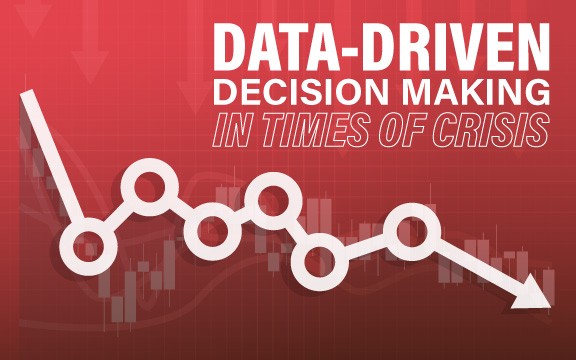Data-Driven Decision Making in Times of Crisis
Authors: Dr. Lourival Carmo Monaco Neto, Postdoctoral Research Associate
Dr. Allan W. Gray, Executive Director and Professor
As the COVID-19 pandemic and the uncertainties that come with it sweep across the world, it is no secret that we are facing very complicated times. Now, all sectors of the economy are being forced to make difficult decisions with many questionable data scenarios. This unprecedented situation provides an opportunity to explore how difficult it is to make any kind of decision (strategical, tactical, etc.) when not enough data is present, the right data cannot be found, there is no data you can trust, or you are facing a combination of all three scenarios. 
The competitive intelligence framework provides a solid foundation for considering the use of data in decision making during uncertain times. Competitive intelligence is the capability of people, organizations and businesses to turn data into intelligence. Data, in and of itself, is not useful. It is merely a number, letter, picture, etc. found in a spreadsheet, document, combine monitor or a website. Regardless of where we locate data and what form it is in, we need enough of it to be able to contextualize.
Contextualization is where we begin to understand the questions of who, what, where, when, how and what for, as it relates to the data. Being able to answer these questions creates credibility and trustworthiness in the data. In addition, we have to have enough data to create a meaningful context. A single data point, several data points, or in many cases, tens or hundreds of data points may not be enough to create a meaningful context. Nonetheless, as we begin to create context for the data, it becomes information.
As we continue to connect data to create bits and pieces of information, we can begin linking this information together. This linking process is much like building a puzzle except there is no box top to guide us in the direction of what the picture should look like. At some point, we link enough of the information together to form a whole picture. This is the point when information becomes knowledge.
In this process, all transformations (data to information to knowledge) are based on history and experience. But our goal is to move from the past to the future. This is where we begin to reflect on multiple whole pictures, join them together and create new insights — this is where we develop intelligence. It is this development of intelligence that allows us to make informed decision about an uncertain future.
The transformation of data into intelligence

Source: Adapted from STEFANIKOVAA e MASAROVAA, 2013.
While this may sound simple, failure to carefully follow the transformation process of turning data into intelligence is often the root cause of faulty decision making. Decision makers need the right information at the right time in the most useful and trustworthy form to be able to make well-informed decisions in an uncertain environment.
In today’s environment, we have been bombarded with a cascade of data and information regarding the number of people infected by COVID-19, the velocity of virus spread, the potential impacts of alternative counter measures, and so on. Governments are the primary decision makers in this scenario, and they must decide which policies to implement to best mitigate a very complicated and dangerous situation. It is important to remember that it is impossible to “do everything”, due to the limitation of overall resources. That said, the decision must evaluate tradeoffs in the allocation of these limited resources to achieve the best result — in this case, to save lives.
At the time of this writing, it seems most nations in the world are still grappling with the data gathering and transformation process. Of course, the dynamics of the situation demand that decisions be made without a perfect data transformation process. Yet, nations will do well to invest significant resources into ramping up their data transformation capabilities as quickly as possible; hence, the push for better, faster and more effective virus testing to improve data gathering, speed and trustworthiness.
Agribusinesses are faced with similar challenges, albeit maybe not quite as dire of circumstances. Building capabilities to effectively and efficiently turn data into information, information into knowledge and knowledge into intelligence is necessary preparation for a company to manage in a crisis situation. Making decisions in a crisis situation where emotions run high without the capabilities needed to create useful intelligence is not a time to simply rely on hope. The need for useful intelligence is reserved for crisis moments, however, these skills can also be used in more normal environments to increase decision making success.
The important message here is that we are faced with a great challenge right now, which is to decide how to move forward with our lives, companies, countries and as a collective whole. To do this, we must make informed decisions by using the right data. We must also transform information into knowledge and knowledge into intelligence in order to make the best, most educated decisions possible. We should be marshalling resources to enhance these capabilities for the immediate crisis and recognize that we should also be investing in these capabilities in more normal times as well.
Tags: Agribusiness, Agriculture, competitive intelligence, crisis management, Data, Decision Making, Food, Strategy
RELATED POSTS:
A trifecta of strategies for agribusinesses amidst unprecedented change
In navigating unprecedented change, agribusinesses must prioritize prediction, adaptability, and resilience to thrive in evolving markets.
The impact of diversification strategies on small and medium enterprises
Exploring diversification and its impact on businesses—insights for strategic resilience amid market uncertainties.
Navigating Resilience: Challenges and strategies in U.S. agricultural and food supply chains
Agribusinesses must balance resilience and efficiency amid disruptions, navigating complex trade-offs and policy impacts for sustainable supply chains.
